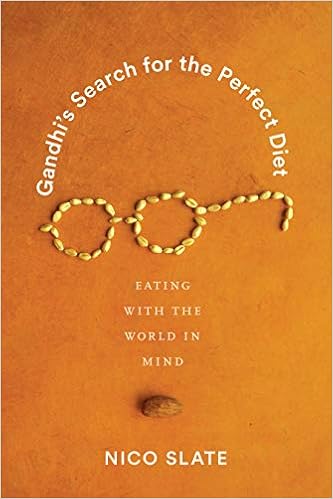Source https://www.foodpolitics.com/2019/03/weekend-reading-gandhis-dietary-aspirations/
Nico Slate. Gandhi’s Search for the Perfect Diet: Eating with the World in Mind. University of Washington Press, 2019.

Let’s start with my blurb:
Nico Slate’s fascinating account reveals Gandhi as an evidence-based, self-experimenting nutrition guru who tried one diet after another—vegan, raw, calorie restriction–in his quest for physical and spiritual health. Above all, Slate explains Gandhi’s use of fasting as a political means to inspire India to achieve independence.
Gandhi, it seems, was a food faddist well ahead of his time. The author says:
As his commitment to vegetarianism deepened, Gandhi grappled with whether he should also forgo eggs and milk. Ultimately, he became convinced that he should become vegan, and renounced all animal products. Living without eggs was relatively easy. Doing without milk, by contrast, proved to be one of the greatest challenges of his life. He experimented with almond milk, peanut milk, and other vegan alternatives. In 1914, he vowed to abstain from all dairy products. But after contracting a serious illness, he decided that his pledge did not include goat’s milk. [p. 47]
The book explains how Gandhi’s dietary choices were tightly linked to his politics.
The social potential of a raw diet led Gandhi to explore the cheapest source of sustenance for the poor: wild food…The greatest ethical challenge stemmed from the limitations of wild food as a remedy for poverty. If the goal was to end hunger, changes in diet would be insufficient if they were not linked to changes in land ownership and the distribution of wealth—change that seemed as impossible as eating ginger nonviolently. [ p. 97]
And one more:
In a world marred by inequality, charity could only do so much. Ultimately, Gandhi did not want to help the poor; he wanted to end poverty. Over time, he developed a deeper understanding of the link between famine and imperialism. “India suffers from starvation because there is dearth not of grain,” he explained, “but of purchasing power.” The absence of purchasing power was, in turn, a direct result of the economic structures of British rule…Recognizing famine as a result of empire inspired Gandhi to demand India’s freedom. [p.127]
Source https://www.foodpolitics.com/2019/03/weekend-reading-gandhis-dietary-aspirations/
Nico Slate. Gandhi’s Search for the Perfect Diet: Eating with the World in Mind. University of Washington Press, 2019.

Let’s start with my blurb:
Nico Slate’s fascinating account reveals Gandhi as an evidence-based, self-experimenting nutrition guru who tried one diet after another—vegan, raw, calorie restriction–in his quest for physical and spiritual health. Above all, Slate explains Gandhi’s use of fasting as a political means to inspire India to achieve independence.
Gandhi, it seems, was a food faddist well ahead of his time. The author says:
As his commitment to vegetarianism deepened, Gandhi grappled with whether he should also forgo eggs and milk. Ultimately, he became convinced that he should become vegan, and renounced all animal products. Living without eggs was relatively easy. Doing without milk, by contrast, proved to be one of the greatest challenges of his life. He experimented with almond milk, peanut milk, and other vegan alternatives. In 1914, he vowed to abstain from all dairy products. But after contracting a serious illness, he decided that his pledge did not include goat’s milk. [p. 47]
The book explains how Gandhi’s dietary choices were tightly linked to his politics.
The social potential of a raw diet led Gandhi to explore the cheapest source of sustenance for the poor: wild food…The greatest ethical challenge stemmed from the limitations of wild food as a remedy for poverty. If the goal was to end hunger, changes in diet would be insufficient if they were not linked to changes in land ownership and the distribution of wealth—change that seemed as impossible as eating ginger nonviolently. [ p. 97]
And one more:
In a world marred by inequality, charity could only do so much. Ultimately, Gandhi did not want to help the poor; he wanted to end poverty. Over time, he developed a deeper understanding of the link between famine and imperialism. “India suffers from starvation because there is dearth not of grain,” he explained, “but of purchasing power.” The absence of purchasing power was, in turn, a direct result of the economic structures of British rule…Recognizing famine as a result of empire inspired Gandhi to demand India’s freedom. [p.127]
What Do You Think?
comments
